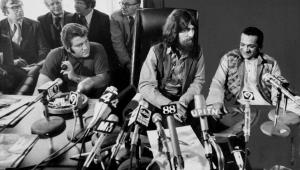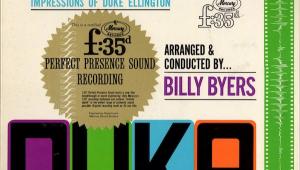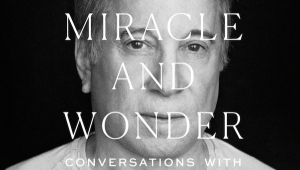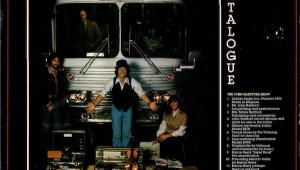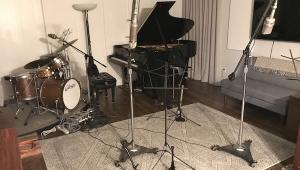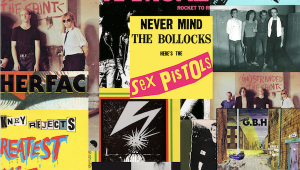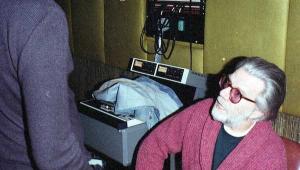Brian Wilson's Legendary Smile Album Part 2
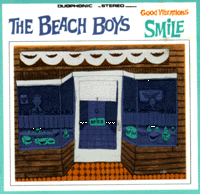
“Canvas the town and brush the backdrop…”
Brian was already smoking pot by late 1964, and his first efforts combining reefer and music were promising: most of the songs on side two of The Beach Boys Today, particularly “Please Let Me Wander”, showed Brian expanding on the beautiful, innocent vulnerability which began with “Surfer Girl”. His arranging skills in particular were growing into something completely different by this time, and culminated with the burnished spiritual gauze of Pet Sounds. Brian later revealed that the gleaming introduction to “California Girls” was composed following his maiden L.S.D. voyage. But, Brian Wilson, a man of delicate psyche to begin with, was probably not someone who should have taken large amounts of psychedelics. But along with this, speed - especially a compound called Desputol (sic) - was becoming more and more prevalent in Brian's world. The result was a man with many of the casebook symptoms of abusing the drug, the biggest and most obvious being overwhelming paranoia. Brian began talking about Murry bugging his house, Phil Spector (and his 'mind gangsters') attempting to freak Brian out via director John Frankenheimer's film “Seconds”. Brian's mind must have been like a spooky house of mirrors at the time. Van Dyke later commented, “If you go to the dark side of the moon, you're lucky that you don't get burned up on re-entry…”
On top of all of this, the very real Mike Love/Capitol Records/Murry Wilson pressure axis was bearing down on him. As well, Brian, for the most part, was looked upon not always as an artist by his extended family, but without coming right out and saying it, the prime benefactor. How can you create art with all of this crap hanging over your head?
Yet somehow - for a little while longer - he did, and the music was getting better. “Cabinessence” was one of the crown jewels of the project. A cinimatic, historical panorama, the song captured the construction of the American railroad, throwing in the prospective of the Oriental laborers Zen mindset for good measure with 'over and over, the crow flies uncover the cornfield…' This was the line, by the way, that broke Mike Love's back (or mind). He actually called Van Dyke into the studio for a literal explanation of that particular line. Understandably miffed, Parks responded with, “Frankly Mike, I don't know what it means.” The track, which appeared in 1968 on 20-20, is a masterpiece. The laid back verses (beautifully sung by Carl Wilson), complete with folksy banjo, piano, guitars and harmonica, suddenly morph into a virtual psychedelic orchestra led by cello, bass and percussion and the group's vocal as a huge rhythm instrument. Suddenly, a Bach-inspired bridge appears: 'Have you seen the Grand Coolie workers workin' on the railroad/over and over the crow flies…' (sung beautifully by Love, by the way) appears as a perfectly inserted film edit. The banjo somehow metamorphosis into sounding like an Indian sarod. In three and a half minutes, this recording takes you around the world and through time.
As the summer ended, Brian finally had the finished master of “Good Vibrations”. “I remember the time we had it,” recalled Brian “I remember I had it right in the sack. I could just feel it when I dubbed it down to mono. It was a rush - a feeling of ….artistic beauty.” It was the only song from the Smile project to actually be released in its lifetime. For one shining moment, with all of the problems and promise of the project, Brian was vindicated. The song - their all-time biggest single, ever - was released in October and was #1 worldwide by Christmas. The Beach Boys were the first band in four years to top The Beatles in England's New Musical Express poll as 'top group'. Between Pet Sounds (which received the kind of reception in Britain it should have in the U.S.), and “Good Vibrations”, it looked like the group could do no wrong by the end of 1966. Smile, it seemed, was only weeks away.
More songs and recordings emerged, including the brilliant four-part 'Elements Suite', which was represented by “Wind Chimes” (air), “Mrs. O'Leary's Cow/Fire” (fire), “Vega-Tables” (earth) and “I Love To Say Da Da” (water). The 'fire' section spooked Brian the most. Truly ahead of its time (even today), it's a percussion-driven track with sliding, droning strings that are maddening and downright frighteningly beautiful. If the recording itself scared Brian even a little, it was the fact that a few buildings near the studio burned down soon after the session that sent him over the edge. Bad vibrations and finding himself playing with the 'dark' magic side of music was enough to apparently send Brian to the point where he was rumored to have attempted actually burning the tapes themselves. They survived.
Other songs included “Do You Like Worms”, “Look”, “Wonderful”, “I'm In Great Shape”, “Holidays”, a medley of “The Old Master Painter” coupled with a cover of “You Are My Sunshine” (sung by Dennis), and a version of Johnny Mercer's “I Wanna Be Around”. “Our Prayer”, a (literally) breathtaking a capella piece sung by the entire group may be one of the most pure and peerless recordings the group ever cut, and was slated to open the album.
Not all of the songs had vocals, and Brian's fragmentary method of recording mentioned earlier was becoming problematic. There were just too many choices on where songs and fragments could go, and an elusive running order that was obviously paramount to an album that seemed to be slipping away.
At the beginning of 1967, Smile was dealt a painful blow when Van Dyke left the project. His reasons for leaving were at least two-fold. Van Dyke left, in his own words, “in the interest of…family unity.” There is no denying that he was looked upon by certain members of the Beach Boys organization as an 'interloper'. But his contributions were invaluable, and Brian (and probably Dennis and Carl, according to interviews from the period) knew it. Van Dyke had also been offered a record deal with Warner Bros., where he already had a working relationship with producer Lenny Waronker. Together, they produced Van Dyke's dazzling (but poor selling) debut solo album, Song Cycle, as well as exquisite albums and singles by The Beau Brummels, Harpers Bizarre, Tom Northcott, The Mojo Men, Ry Cooder and Randy Newman. But although Van Dyke was gone, he left more than enough material for at least one album - if not two. The point is Parks didn't “abandon” the project without contributing enough work. He fleetingly returned in late March '67, but for all intent, he was gone.
Brian then only had one or two sessions during the entire month of April. Finished masters along with vocal-less songs and fragments piled up.
“Beyond belief, a broken man too tough to cry…”
The problems piled up. Between Brian getting involved with the business affairs of the group (which distracted and troubled him), Carl Wilson's draft problems (he was actually detained by the FBI due to his C.O. status) there were more than enough things to keep him distraught and away from finishing the album. Two of the most immediate problems popped up close to each other and may have been the straws that broke the camel's back. One was the band backing out of the Monterey Pop Festival at Brian's request. According to Brian, he could see the band on the same stage as The Mamas & The Papas…but not the Dead/Airplane/Hendrix, etc. How the band would have been received at the festival is a tough thing to speculate. Anyway you look at it though, their no-show virtually stopped any hip credibility that the band had left in its tracks.
The other problem was the pressure to not only finish the album, but to at least complete and release “Heroes and Villains” as the first single on the new Brother Records imprint. This is the point where David Anderle had to leave. To Brian, their relationship, which has only weeks before had been filled with good times and brainstorming was suddenly invaded by business.
In May it was announced by then-press agent Derek Taylor that Smile was shelved. In mid-June (right at the time of Monterey Pop), Brian and the rest of the Beach Boys pieced together the 'final' version of “Heroes And Villains”, which was released in July. An incredibly interesting and almost arresting record, it limped to #12- hardly the showing expected for the most anticipated single of the era. With it's muddy mix and dubious edits, it was lucky to get that high on the charts, especially when you listen to some of the previously unreleased, alternate (original, actually) versions. It was the first time Brian “undersold” a record…and it wouldn't be the last.
The aftermath of Brian's retreat and the rocky destiny of the Smile material went something like this: “Brian took a benign, passive interest, instead of a domineering interest,” Mike Love explained to Byron Preiss “ At that time something happened to his whole ego drive. It had been very powerful until the time of “Heroes And Villains” release - he was about ready to come out with the Smile album and he was feeling very dramatic and creative and then something happened, chemically that completely shattered that, that made him the complete opposite…that made him want to withdraw. He was still creative, though…Brian had lost interest in being aggressive and he went in the other direction. Still creative, and different, but it wasn't competitive.”
September saw a new Beach Boys album release: Smiley Smile. Aside from “Good Vibrations” and bits of “Heroes And Villains”, it contains no music from the Smile sessions. Recorded in two weeks at Brian's new home studio in Bel Air, it is to The Beach Boys what Satanic Majesties is to the Stones -a spacey album that is somewhat out of place with the rest of the group's catalogue. Interestingly though, like the Stones album, it has aged fairly well as a curio of the era. The newly recorded versions of the Parks/Wilson collaborations (“Vegetables”, “Wind Chimes”, “Wonderful” and “Heroes And Villains”) are pale re-enactments of the originals, but some of the newly written material, especially “With Me Tonight”, “Little Pad” and “Whistle In” are quietly resplendent little revelations.
“Farther down the path was a mystery…”
Aside from bootlegs - which thankfully began appearing in the 1980's - some of the actual Smile recordings were parted out sparingly on different Beach Boys albums, and were more often than not the highlights of those records. 1968's 20-20 (their last Capitol album) closed out with “Our Prayer” and “Cabinessence”. 1970's Sunflower (their first Warner Bros. release) had the spooky and beautiful fragment of the 'water' segment of 'The Elements Suite' (“I Love To Say Da Da”) in “Cool, Cool Water”). But the most anticipated and successful release was the granddaddy of them all: “Surf's Up”, from the 1971 album of the same name. In this recording, the group (primarily Carl) took some artistic liberty with the three-part suite. Utilizing the basic 1966 backing track, Carl sang the first section ('A diamond necklace played the pawn…') of the song brilliantly, while adding a few discreet overdubs. The second section ('Dove nested towers…') returns the song back to Brian's 1966 original before closing with the 'Child is father to man' couplet, which combines original and new vocals. Nearly five years later, the song lived up to it's potential in a new and exciting way. The greatest music is supposed to give the allusion of time being suspended, and on this recording, it truly does that. Feeling like a ten minute epic, the track is barely four…but you'd never know it.
“I'm fit with the stuff, and sunny down snuff I'm alright… by the heroes and villains.”
But a 'completed' Smile was never to be…and perhaps this was for the best. Although apparently originally a contractual obligation when the band signed with Warner's, in '69, and often rumored to be on it's way, it never materialized. Every three years or so over since Dennis Wilson's death it's been rumored that Capitol was going to release a Smile “sessions” package, often described as a two disc set… another constant non-event. Not surprisingly, all of this makes the myth grow stronger every year. No matter how you look at it, nostalgia is indeed an epic historical component here. Yet, the music is so peerless and ahead of its time, calling it nostalgic is simply not appropriate.
But now, with the overwhelmingly successful live shows and a newly-recorded studio Smile album due this fall (it is in the mixing stages as this is being written in June, 2004), Smile seems to be reaching a state of… resolution.
The interview with Darian Sahanaja that will be posted shortly, will provide you with the details of the project's resuscitation, from the initial idea of performing the music live, to scouring the vaults for material, the actual shows… and finally, the new studio recording. Darian, aside from being a very fine musician and a totally musical man - interested and interesting - is a good guy to have a friend. Enjoy the interview.
©2004 M. Greenwald






